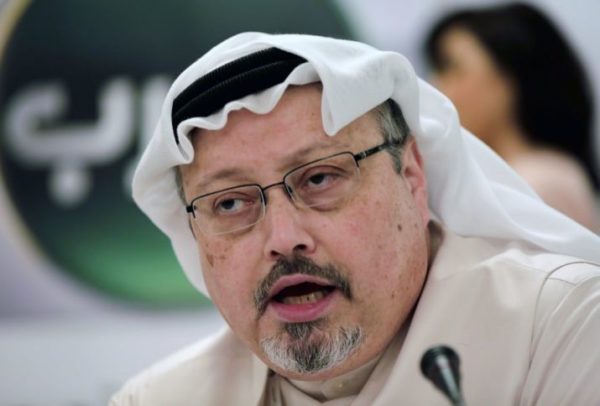The Saudi Arabia’s narrative of journalist Jamal Khashoggi’s death “that he was killed in a brawl following discussions with visiting officials in the consulate” has met with international skeptism as it contrasts with Turkish pro-government media reports that a Saudi hit squad, including an autopsy expert, traveled to Istanbul to kill Khashoggi and dispose of his body, which has not yet been found.
The overnight statement, released by the state-run Saudi Press Agency, that the writer died in the consulate also came more than two weeks after Khashoggi, 59, entered the building for paperwork required to marry his Turkish fiancée and never came out. Saudi Arabia initially denied any knowledge of his disappearance.
Saudi Arabia said 18 Saudi suspects were in custody and intelligence officials had been fired. But critics believe the complex scheme that led to Khashoggi’s death could not have occurred without the knowledge of Mohammed bin Salman, the 33-year-old crown prince whose early promises of sweeping reform are being eclipsed by concerns that he may be an impulsive, even sinister figure.
The kingdom has described assertions in Turkish media leaks, based on purported audio recordings that Khashoggi was tortured, killed and dismembered inside the consulate, as “baseless.” Turkish politicians pushed back Saturday.
“It’s not possible for the Saudi administration to wiggle itself out of this crime if it’s confirmed,” said Numan Kurtulmus, deputy head of Turkey’s Justice and Development Party. He also said Turkey would share its evidence of Khashoggi’s killing with the world and that a “conclusive result” of the investigation is close.
Another Turkish ruling party official, Leyla Sahin Usta, also criticized Saudi Arabia, saying the kingdom should have given its explanation “before the situation reached this point.” She said it would have been “more valuable” if Saudi officials had earlier admitted that Khashoggi was killed in its diplomatic post.
In firing officials close to Prince Mohammed, Saudi Arabia stopped short of implicating the heir-apparent of the world’s largest oil exporter. King Salman, his father, appointed him to lead a committee that will restructure the kingdom’s intelligence services after Khashoggi’s slaying. No major decisions in Saudi Arabia are made outside of the ultraconservative kingdom’s ruling Al Saud family.
Khashoggi, a prominent journalist and royal court insider for decades in Saudi Arabia, had written columns critical of Prince Mohammed and the kingdom’s direction while living in self-imposed exile in the U.S.
“God have mercy on you my love Jamal, and may you rest in Paradise,” Khashoggi’s fiancée, Hatice Cengiz, tweeted following the Saudi announcements.
UN Secretary-General Antonio Guterres urged “a prompt, thorough and transparent investigation into the circumstances of Mr. Khashoggi’s death and full accountability for those responsible,” spokesman Stephane Dujarric said.
Standing outside the Saudi consulate in Istanbul, the head of a media group said the “authority that gave the orders” in the killing of Khashoggi should be punished.
Turan Kislakci, president of the Turkish Arab Media Association, said Khashoggi was “slaughtered by bloody murderers” and that his group wants “true justice” for its slain colleague.
White House press secretary Sarah Huckabee Sanders said the US will advocate for justice in the Khashoggi case that is “timely, transparent and in accordance with all due process.”
Trump has called the Saudi announcement a “good first step,” but said what happened to Khashoggi was “unacceptable.”
The Saudi announcements about Khashoggi came in statements carried by the state-run Saudi Press Agency.
“Preliminary investigations conducted by the Public Prosecution showed that the suspects had traveled to Istanbul to meet with the citizen Jamal Khashoggi as there were indications of the possibility of his returning back to the country,” the statement read. “Discussions took place with the citizen Jamal Khashoggi during his presence in the consulate of the kingdom in Istanbul by the suspects (that) did not go as required and developed in a negative way, leading to a fistfight. The brawl led to his death and their attempt to conceal and hide what happened.”
There’s been no indication Khashoggi had any immediate plans to return to the kingdom.
The Saudi statements, which expressed regret and promised accountability, did not identify the 18 Saudis being held by authorities and did not explain how so many people could have been involved in a fistfight.
The kingdom at the same time announced the firing of four top intelligence officials, including Maj. Gen. Ahmed bin Hassan Assiri, a one-time spokesman for the Saudi military’s campaign in Yemen who later became a confidant of Prince Mohammed.
Saud Qahtani, a powerful adviser to the prince, also was fired. Qahtani had led Saudi efforts to isolate Qatar amid a boycott of the country by the kingdom and three other Arab nations as part of a political dispute.
On Twitter, where Qahtani had launched vitriolic attacks against those he saw as the kingdom’s enemies, he thanked the Saudi government for the opportunity to serve.
“I will remain a loyal servant to my country for all times,” he wrote.






Leave a reply